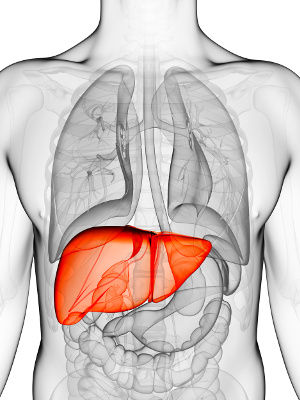Magnesium deficiency worsens liver diseases and related cardiovascular conditions
 Non-alcoholic fatty liver disease (NAFLD) and alcoholic fatty liver disease are associated with the development of other liver diseases, obesity, diabetes, cardiovascular diseases, and cancer. Diet and drinking habits play a major role. Magnesium deficiency also seems to increase the risk of cardiovascular disease and other complications, particularly in individuals with liver-related metabolic disorders, according to a large population study published in Nutrients.
Non-alcoholic fatty liver disease (NAFLD) and alcoholic fatty liver disease are associated with the development of other liver diseases, obesity, diabetes, cardiovascular diseases, and cancer. Diet and drinking habits play a major role. Magnesium deficiency also seems to increase the risk of cardiovascular disease and other complications, particularly in individuals with liver-related metabolic disorders, according to a large population study published in Nutrients.
Modern lifestyle is responsible for one in four people having non-alcoholic fatty liver disease, often unwittingly. This disease, which develops slowly, is caused by increased fat accumulation in the liver (steatosis). Over time, some individuals develop a form of liver inflammation known as non-alcoholic steatohepatitis (NASH), a condition that leads to critical liver scarring (fibrosis). It is characterized by chronic inflammation and oxidative stress, where the impact of free radicals is out of control. All of the metabolic disturbances associated with NASH increase the risk of cardiovascular disease and premature death. The same applies to fatty liver caused by alcohol abuse.
Previous studies have shown that diet plays a major role in the development of NAFLD, especially high consumption of refined carbohydrates and particularly fructose (fruit sugar) from sugar, juice, corn syrup, and other sweeteners that can strain the liver and turn it into a fat factory. Pure alcohol (ethanol), which is produced by fermenting carbohydrates, can also affect liver cell metabolism, leading to fat accumulation.
As shown, diet and drinking habits greatly influence the liver’s many functions. In this context, the new study aimed to examine whether magnesium deficiency is associated with increased mortality from cardiovascular disease and all other causes in patients with NAFLD and alcoholic fatty liver disease.
The greater the magnesium deficiency, the higher the risk of liver damage and premature death
The study included 3,802 participants from a large American study called NHANES (National Health and Nutrition Examination Survey), which examines the population’s dietary habits and health over time. In the new study, participants were followed for 26 years. Their magnesium intake - primarily from whole-foods and greens - was assessed using a special scale. Additionally, blood magnesium levels were evaluated based on magnesium absorption, kidney function, and other factors.
The relationship between magnesium deficiency, cardiovascular disease, cancer, and early death was analyzed using another model called Cox regression.
The combined population study of participants with metabolic disorders caused by NAFLD and alcoholic fatty liver revealed that magnesium deficiency was associated with:
- Increased all-cause mortality
- Increased cardiovascular mortality
- The greater the magnesium deficiency, the higher the risk of premature death
The researchers therefore conclude that the global magnesium deficiency is associated with an increased risk of cardiovascular disease and early death in patients with metabolic disorders in the liver caused by NAFLD and alcoholic fatty liver. Optimizing magnesium status in these patients may also have long-term positive effects on their overall health and life expectancy.
How does magnesium affect liver health and blood sugar?
Magnesium is involved in several hundred enzyme processes that are important for cellular energy metabolism, immune defense, inflammation regulation, insulin sensitivity, and vitamin D activation. It also regulates cellular calcium uptake, thereby ensuring that calcium is primarily absorbed into bone cells, while soft tissue cells like those in the liver and nervous system remain nearly devoid of calcium. This function is crucial because calcium flooding of soft tissue cells overstimulates and stresses them, leading to cramping, inflammatory processes, and cell death.
According to the review article, low magnesium status is associated with both chronic systemic inflammation and insulin resistance - a condition in which cells have reduced ability to absorb blood sugar. These metabolic disturbances make the liver more vulnerable to damage and liver disease.
A diet richer in magnesium also appears to be associated with a lower risk of developing various types of fatty liver disease caused by unhealthy diet or alcohol.
The new study is the first to reveal a direct link between magnesium status and cardiovascular disease, cancer, and all-cause mortality in individuals with NAFLD and alcoholic fatty liver.
Where can you find magnesium - and why is deficiency so widespread?
We primarily get magnesium from wholesome and green foods such as whole grains, vegetables, legumes, and nuts. Deficiencies are mainly due to soil depletion and the modern refined diet. Additionally, diuretic medications, antacids, alcohol, overweight, insulin resistance, and diabetes can increase the need for magnesium.
The official recommended daily intake of magnesium is 375 mg. However, several researchers recommend a daily intake of around 500 mg to support the many enzyme functions and overall health. Any supplements should preferably be in the form of organic compounds with high bioavailability.
References:
Lei Fan. Magnesium Depletion Score and Mortality in Individuals with Metabolic Dysfunction Associated Steatotic Liver Disease over a Median Follow-Up of 26 Years. Nutrients 2025
Àkos Géza et al. Magnesium Is a Vital Ion in the Body – It Is Time to Consider Its Supplementation on a routine Basis. Clinics and Practice 2024
Grasgruber P, Cacek J Hrazdira E et al. Global correlates of cardiovascular risk: a comparison of 158 countries. Nutrients 2018
TIP! See also the related articles
Search for more information...
- Created on .








